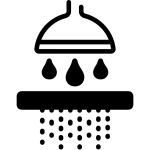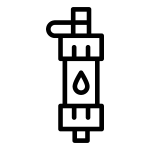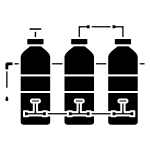Have you ever turned on your faucet only to find that the water flowing out is cloudy, milky, or white in appearance? If so, you’re not alone. Many homeowners and renters experience this issue and wonder: “Why is the water from my faucet cloudy?”
In this comprehensive guide, we’ll break down everything you need to know about cloudy tap water, from its causes to solutions and how to prevent it. Whether you’re concerned about safety, looking to improve water quality, or searching for a filtration system to install, this post is for you.
Table of Contents
- What Does Cloudy Water Look Like?
- Is Cloudy Water Safe to Drink?
- Top 7 Reasons Why Water from Your Faucet is Cloudy
- How to Test Cloudy Water at Home
- Best Ways to Fix Cloudy Tap Water
- When to Call a Plumber or Utility Company
- How Water Filters and Purifiers Can Help
- Recommended Products from Cuoll
- Frequently Asked Questions
- Final Thoughts
What Does Cloudy Water Look Like?
Cloudy water, also known as turbid water, often appears milky, hazy, or white when first dispensed from the faucet. You might notice:
- Tiny air bubbles trapped in the water
- A chalky residue on your glass
- Cloudiness that clears from the bottom up
Understanding the appearance is the first step in diagnosing the problem.
Is Cloudy Water Safe to Drink?
In many cases, cloudy water is harmless and caused by trapped air. However, if the cloudiness is due to sediment, bacteria, or chemicals, it could pose a health risk.
You should not drink cloudy water until you identify the source. If in doubt, use a certified water filter or boil the water before consumption.
Top 7 Reasons Why Water from Your Faucet Is Cloudy
1. Air Bubbles in the Water
This is the most common and least dangerous reason. Cold weather or changes in water pressure can trap air inside your pipes. When the water comes out, these air bubbles give it a cloudy appearance but disappear in a few seconds.
Quick Test:
Let the water sit in a clear glass for a few minutes. If it clears from the bottom up, it’s just air.
2. High Mineral Content (Hard Water)
Hard water contains excess calcium and magnesium, which can cause cloudiness, scale buildup, and even skin irritation.
Solution:
Install a whole-house water softener or a filter designed for hard water.
3. Sediment or Rust from Old Pipes
If your pipes are old or corroded, they can release rust or mineral particles into your water, causing a cloudy or brownish appearance.
Indicators:
- Cloudiness doesn’t go away after sitting
- Water has a metallic taste
- You notice rust stains in the sink
Solution:
Replace old pipes and use a sediment pre-filter.
4. Water Heater Issues
Sometimes cloudy water only comes from the hot water tap, which could indicate sediment buildup in your water heater.
Fix:
Flush the water heater tank regularly or replace it if it’s too old.
5. Municipal Water Supply Disturbances
Cloudy tap water may result from recent maintenance or construction in your area. Utility companies sometimes stir up sediments or change water pressure.
What to Do:
Contact your local water authority to confirm. Use a faucet water filter during this time.
6. Bacterial Contamination
Though rare in treated municipal systems, bacteria can cause cloudy water if there’s a breach in the supply line or well water contamination.
Signs:
- Cloudy water with a smell
- Unusual taste
- Illness after drinking
Action:
Stop using the water immediately and get it tested by a lab.
7. Chemical Contamination
Chemicals like chlorine, fluoride, or even industrial waste can sometimes cause cloudy or discolored water.
How to Identify:
- Strong chemical odor
- Eye or skin irritation after use
Fix:
Install an activated carbon filter or reverse osmosis purifier.
How to Test Cloudy Water at Home
If you’re wondering why is the water from my faucet cloudy, here are some DIY steps:
- Fill a clear glass with water and let it sit.
- Observe how long the cloudiness takes to clear.
- Use home testing kits for:
- pH
- Hardness
- Chlorine levels
- Bacteria (some kits available)
For accurate results, you can also send a sample to a local water testing lab.
Best Ways to Fix Cloudy Tap Water
✔️ Use a Faucet Water Filter
Attaches directly to your kitchen tap. Great for removing chlorine, sediment, and bacteria.
✔️ Install a Whole-House Water Purifier
Cleans all incoming water—ideal for larger homes and hard water areas.
✔️ Try a Reverse Osmosis System
Removes nearly all contaminants including heavy metals, fluoride, and microplastics.
✔️ Flush Pipes Regularly
Run the faucet for a few minutes or flush your water heater if you haven’t used it in a while.
✔️ Soften Hard Water
Use a Cuoll water softener to prevent calcium buildup and cloudiness.
When to Call a Plumber or Utility Company
Contact a professional plumber or your local water supplier if:
- The cloudiness doesn’t go away
- Water smells bad or tastes off
- You experience health symptoms
- There’s rust or scale in your water
They can inspect your system and recommend plumbing upgrades or filtration solutions.
How Water Filters and Purifiers Can Help
At Cuoll, we provide a wide selection of high-quality water filters, purifiers, and bathtub filters that eliminate:
- Sediment
- Bacteria
- Chlorine
- Iron & rust
- Hard minerals
Key Benefits:
- Better taste and odor
- Healthier skin and hair
- Longer lifespan of plumbing and appliances
- Peace of mind for your family
Recommended Products from Cuoll
Here are some top-rated solutions to fix cloudy faucet water:
1. Cuoll 3-Stage Faucet Water Filter
- Removes sediment, chlorine, and microbes
- Easy to install
- Perfect for kitchen use
2. Cuoll Whole-House Water Softener & Filter
- Treats hard water and sediment at the source
- Great for families and multi-story homes
3. Cuoll Reverse Osmosis System
- Advanced filtration for clean drinking water
- Removes 99.9% of contaminants
4. Bathtub Filter Ball
- Ideal for removing chlorine and minerals from bathwater
- Perfect for sensitive skin
You can explore all these products in the Cuoll Shop to find the perfect solution for your home.
Frequently Asked Questions
❓ Why is only my hot water cloudy?
This typically means your water heater has sediment buildup. Flushing the tank can help.
❓ Is cloudy water harmful to pets?
Yes, it could be—especially for small pets like fish or reptiles. Use filtered water for their bowls or tanks.
❓ How often should I change my water filter?
Every 3 to 6 months, depending on usage and water quality.
❓ Can cloudy water damage appliances?
Yes. Sediment and hard minerals can clog plumbing, reduce efficiency, and shorten appliance life.
Final Thoughts
So, why is the water from my faucet cloudy? The answer varies from harmless air bubbles to serious contamination. Identifying the cause is key to finding the right solution. If you’re unsure, always test your water or consult an expert.
For the safest, cleanest water possible, trust Cuoll’s advanced filtration systems and home water solutions. Explore our collection of:
- Water purifiers
- Filter cartridges
- Bathtub filters
- Reverse osmosis systems
- Whole-house filters
Don’t let cloudy water cloud your peace of mind. Shop at Cuoll today and enjoy clear, clean, and safe water every day.
👉 Visit Cuoll now to browse water filters, purifiers, and home improvement solutions!







